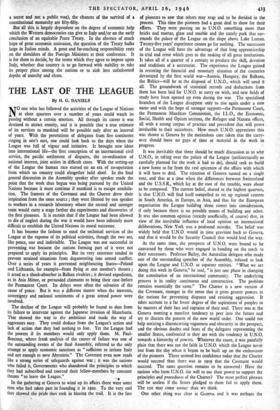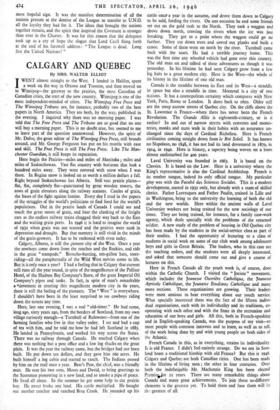THE LAST OF THE LEAGUE
By H. G. DANIELS NO one who has followed the activities of the League of Nations at close quarters over a number of years could watch its passing without a certain emotion. All through its career it was destined to attract enmity, and it is possible that a true estimate of its services to mankind will be possible only after an interval of years. With the perorations of delegates from five continents ringing in one's ears, one could look back to the days when the League was full of vigour and initiative. It brought new ideas into international life—the first conception of an international civil service, the pacific settlement of disputes, the co-ordination of national interest, joint action in difficult cases. With the setting-up of the League the human race started on an era of co-operation from which no country could altogether hold aloof. In the final general discussion in the Assembly speaker after speaker made the point that the work thus begun was being pursued by the United Nations because it must continue if mankind is to escape annihila- tion. The framers of the Covenant and the Charter drew their inspiration from the same source ; they were likened by one speaker to workers in a research laboratory where the second and stronger team would carry a stage farther the experiments and discoveries of the first pioneers. It is certain that if the League had been allowed to die of neglect during the war it would have been infinitely more difficult to establish the United Nations its moral successor.
It has become the fashion to extol the technical services of the League at the expense of its political activities, though the two are, like peace, one and indivisible. The League was not successful in preventing war because the nations forming part of it were not prepared to apply its principles. But its very existence tended to prevent strained situations from degenerating into armed conflict. Over a series of years it prevented neighbouring States—Poland and Lithuania, for example—from flying at one another's throats ; it acted as a shock-absorber in Balkan rivalries ; it devised expedients, as in Asia Minor, or persuaded claimants to bring their case -before the Permanent Court. Its delays were often the salvation of the cause of peace. But it was a different matter when the interests, sovereignty and national sentiments of a great armed power were involved.
The decline of the League will probably be found to date from its failure to intervene against the Japanese invasion of Manchuria. That showed the way to the ambitious and made the way of aggressors easy. They could deduce from the League's action and lack of action that they had nothing to fear. Yet the League had the powers if its members would only apply them. M. Paul- Boncour, whose frank analysis of the causes• of failure was one of the outstanding events of the final Assembly, referred to the only attempt to apply economic sanctions as " sufficient to irritate Italy and not enough to save Abyssinia." The Covenant even now reads like a strong series of safeguards against war ; it was the nations who failed it, Governments who abandoned the principles to which they had subscribed and coerced their fellow-members by constant threats " to leave the League.".
, In the gathering at Geneva to wind up its affairs there were some men who had taken part in founding it in 1920. To the very end they showed the pride they took in blazing the trail. It is the fate
of pioneers to sow that others may reap and to be derided in the process. This time the pioneers had a great deal to show for their efforts. They were passing on to U.N.O. something more than bricks and mortar, glass and marble and the stately park that sur- rounds the palace of the League on the slope above Lake Leman. Twenty-five years' experience cannot go for nothing. The successors of the League will have the advantage of that long apprenticeship in trial and error which goes to the making of all great institutions. It takes all of a quarter of a century to produce the skill, devotion and traditions of a secretariat. The experience the League gained in restoring the financial and monetary situation of the countries devastated by the first world war—Austria, Hungary, the Balkans, the Baltics—will be at the disposal of U.N.O., which will need it all. The groundwork of statistical records and deductions from them has been laid for U.N.O. to carry on with, and new fields of study have been opened up even during the war. The specialised branches of the League disappear only to rise again under a new name and with the hope of stronger support—the Permanent Court, the Permanent Mandates Commission, the I.L.O., the Economic, Social, Health and Opium sections, the Refugee and Nansen offices,
all with a strong corpus of practice and precedent that will prove invaluable to their successors. How much U.N.O. appreciates this was shown at Geneva by the meticulous care taken that the carry- over should leave no gaps of time or material in the work in progress.
It was inevitable that there should be much discussion as to why U.N.O., in taking over the palace of the League (architecturally so carefully planned for the work it had to do), should seek to build a new home so far from the real epicentre of the affairs with which it will have to deal. The rejection of Geneva turned on a single vote, and that at a time when the differences between Switzerland and the U.S.S.R., which lay at the root of the trouble, were about to be composed. The current belief, shared in the highest quarters, is that U.N.O. will find itself compelled to set up regional centres in South America, in Europe, in Asia, and that for the European organisation the League building alone comes into consideration, if only because there is no possible means of building any other. It was also common opinion (strictly unofficially, of course) that, in view of the inevitable influence of local opinion on international deliberations, New York was a profound mistake. The belief was widely held that U.N.O. would in time gravitate back to Geneva, and that it would be the Security Council that would lead the way. At the same time, the prospects of U.N.O. were bound to be canvassed by those who were engaged in handing on the torch to their successors. Professor Bailey, the Australian delegate who made one of the outstanding speeches of the Assembly, refused to look upon the League and U.N.O. as separate entities. " What we are doing this week in Geneva," he said, " is just one phase in changing the constitution of an international community. The underlying process is in reality continuous and constructive. The problem remains essentially the same." The Charter is a new version of the Covenant, stronger in the sense that it gives greater powers to the nations for preventing disputes and resisting aggression. It takes account to a far lesser degree of the aspirations of peoples to be masters of their fate and captains of their soul. There was at the Geneva meeting a manifest tendency to peer into the future and try to discern the pattern of the new world order. One could not help noticing a disconcerting vagueness and obscurity in the prospect, and the obvious doubts and fears of the delegates representing the smaller States, confronted as they are with the tendency in U.N.O. towards a hierarchy of powers. Whatever the cause, it was painfully plain that there was not the faith in U.N.O. which the League never lost from the day when it began to be built up on the enthusiasm of the pioneers There seemed less confidence today that the Charter would succeed than there was in 1919 that the Covenant would succeed. The same question remains to be answered : Have the nations who form U.N.O. the will to use their power to support the principles and procedures of the Charter? The most perfect phrases will be useless if the States pledged to them fail to apply them. The test may come sooner than we think.
One other thing was clear at Geneva, and it was perhaps the most hopeful sign. It was the manifest determination of all the nations present at the demise of the League to transfer to U.N.O. all the loyalty they had for it. The ideas that brought the nations together remain, and the spirit that inspired the Covenant is stronger than ever in the Charter. It was for this reason that the delegates took up as a cry of hope the slogan that Lord Cecil flung forth at the end of his farewell address : " The League is dead. Long live the United Nations! "



























 Previous page
Previous page